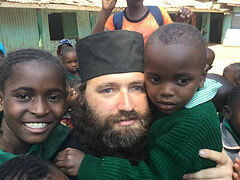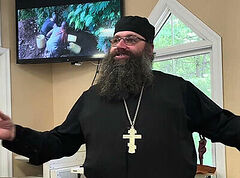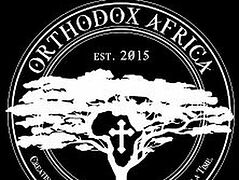 Hieromonk Silouan (Brown) Several years ago, Metropolitan Jonah began building a new monastery outside Washington, DC. Dedicated to the Great Martyr Demetrios of Thessaloniki, it became the first Russian Orthodox brotherhood in the area of the U.S. capital. Fr. Silouan (Brown) was the first monk there. Now he spends most of his time serving the ROCOR mission in Uganda, but from time to time he returns here—to “recharge his batteries,” as he says.
Hieromonk Silouan (Brown) Several years ago, Metropolitan Jonah began building a new monastery outside Washington, DC. Dedicated to the Great Martyr Demetrios of Thessaloniki, it became the first Russian Orthodox brotherhood in the area of the U.S. capital. Fr. Silouan (Brown) was the first monk there. Now he spends most of his time serving the ROCOR mission in Uganda, but from time to time he returns here—to “recharge his batteries,” as he says.
—Father Silouan, you are a member of St. Demetrios monastery near DC. What does this monastery mean for you?
—It is home. Many of us are working clergy with parish responsibilities all over Virginia and Africa. We have a mission; we have priests. Ultimately, it is a very difficult calling to be a priest. So, the monastery is where we return to and recharge our batteries. It is the same way for everybody in many ways.
I had some friends on Mount Athos. Some years ago, there was a real shortage of clerics in Greece. One of the local bishops went to Athos and asked a number of hieromonks to come down from the Holy Mountain and serve at some of his local parishes. That bishop said he would build them a monastery where they could go and recharge their batteries. This monastery was set up with five hieromonks and three simple monks. On a rotating basis, one of the hieromonks would continue to do all daily cycle services, and the others were assigned and had their obediences in parishes around Greece. Then, when they returned to the monastery, they could re-focus on what is truly important: Christ and living the monastic life. So, their monastery became the place where they could recharge their batteries and get ready for active ministry in the world.
That is the way I see the monastery here. I have many challenges in Africa, and many times, I get beat up. But the monastery here is a safe place where I can go back to be with my brothers, be in church, recover, and come back to Africa and do it again.
—Why did you choose this monastery several years ago? Or did the monastery choose you?
 Metropolitan Jonah (Paffhausen) —My spiritual father chose me. I was significantly wounded by my time in the military when I served in Iraq. It beat me up emotionally, psychologically, spiritually, and physically. I ran into many situations that were just extremely painful and abusive. Metropolitan Jonah (Paffhausen) was probably the only spiritual father with enough patience to let me heal and get to where I am today.
Metropolitan Jonah (Paffhausen) —My spiritual father chose me. I was significantly wounded by my time in the military when I served in Iraq. It beat me up emotionally, psychologically, spiritually, and physically. I ran into many situations that were just extremely painful and abusive. Metropolitan Jonah (Paffhausen) was probably the only spiritual father with enough patience to let me heal and get to where I am today.
I do not like the East Coast; I would love to be in the West. I grew up in Colorado. But finding a true spiritual father can be extremely difficult; you must be where you can get it. Whatever I do; I give myself 100 percent to it until God redirects me. I gave myself 100 percent to joining Metropolitan Jonah when he started this monastery. Then I was given the obedience to work in Africa, and I give myself 100 percent there, and will continue to do so for as long as God blesses and directs me. That is where I go.
—You became the first monk in the monastery. How did that happen? And what was the monastery’s life at that time?
—A: Metropolitan Jonah had started a monastery dedicated to St. John of Shanghai and San Francisco in California many years ago. It had a large brotherhood. Then, he was elected the Metropolitan and primate of the Orthodox Church of America (OCA). It was a short-lived obedience, and he went through many different situations and convergences.
I had met him around twenty years earlier, when he was still a hieromonk. So, we knew of each other. Shortly after Vladyka Jonah retired from the OCA, Metropolitan Hilarion (Kapral), the First Hierarch of the ROCOR, told me to find another monastery because he had closed down the monastery where I was tonsured a ryassaphore monk. Metropolitan Jonah was saying at the time that he wanted to start another monastery. However, he was still recovering from the traumas related to his retirement.
So, founding the monastery was a process; I think both of us were looking, waiting, and discerning what God wanted to do next with us as individuals and eventual members of the brotherhood, putting one foot in front of the other and living the life in Christ. The goal of a solid monastic brotherhood was always on the horizon.
 Ordination of Hieromonk Silouan. Photo: virginiamonks.org
Ordination of Hieromonk Silouan. Photo: virginiamonks.org
The monastery is very full now, and we must find a bigger place. People want to join us, but there is no room in our monastery. However, I am confident that God will provide everything this monastery needs as long as we remain faithful to him.
Vladyka Jonah has a special gift for helping young men struggling in their ways and lives and giving them the support and patience to be healed and find Christ.
—Have you seen monastery life in other countries—in Russia, Ukraine, or others? How does it correspond to what you have at St. Demetrios?
—Vladyka Jonah’s spiritual father, Bishop Pankratiy, is the Abbot of Valaam. The last time I was there, I was told that when the monks were reopening the monastery after the fall of the Soviet Union, they did not really thrive under a strict Russian Typicon. So, they brought in some Athonite monks, who brought with them some of the best of the Athonite traditions. So, the brotherhood in Valaam was basically able to come up with the best of Russia and Greece in their monastic Typicon. And you can see in their chants, even today, a syntheses of the monastic traditions.
So, that influence was powerful with Metropolitan Jonah; in addition to that, from St. Silouan to St. Sofrony to Elder Zacharias in Essex monastery (monastery of St. John the Baptist in Essex, England), there has been a real emphasis on the Jesus prayer, and its place in our spiritual and psychological healing. So, our monastery is very similar to the All Saints skete on Valaam. We have the Liturgy, Vespers, and Hours. Still, we also have periods of sitting and silence as the brotherhood says the Jesus prayer. It is kind of a synthesis coming through Valaam; it is a synthesis of the best of America, the best of Greece, the best of Russia, and desert spirituality—the focus on the Jesus prayer and using it as a tool to uproot our deeply rooted passions.
—Can you share your experience of your personal relations with your heavenly patron, St. Demetrios? How do you talk to him? What answers do you hear?
—I visited him in Thessaloniki, and I asked for his help. But this relationship comes really from Metropolitan Jonah, not me directly. When he was starting his first monastery, he took a trip to Greece; he had many young men who wanted to come and live the monastic life. Vladyka was in Thessaloniki, went to St. Demetrios, and said: “I have these young men; they really want to be monks, but I do not have a place for them. Please help!”
When he returned to the US, a very large check from a donor was in the mail waiting for him. It was clear that St. Demetrios’s help allowed him to build his first monastery.
So, I do not know how to describe the relationship any more straightforwardly than to say that we are co-workers…
—Now you spend almost all your time in Africa, serving a mission in Uganda. Do you want to open a St. Demetrios chapter or an independent monastery in Uganda sometime in the future?
—I do not have any plans for that. Clearly Africa needs strong monasticism, and a couple of monasteries are doing some excellent work bringing up young monastics. Definitely, monasticism is the backbone of the Church and its Evangelization. That being said, God can do whatever He wants, but I do not see myself as having that charism. I do not think that this is my talent. It would be very difficult to imagine myself as superior to the monastery, an abbot, or something like that. I do not think it is me, but… God has surprised me many times before, so—He knows.




